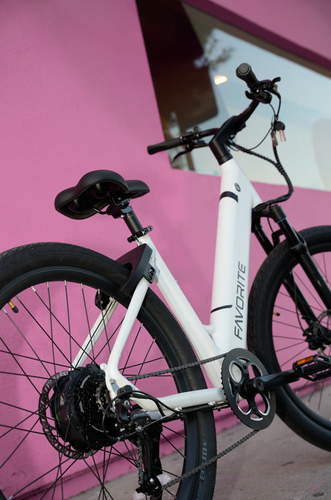
Choosing the Best Chain Lube for Your E-Bike
Table of Contents
Your e-bike chain plays a crucial role in ensuring smooth performance and longevity, and using the right chain lubricant is key to keeping it in top condition. With the added stress of motor-assisted power, e-bike chains require special care, so picking the right lube isn’t just about convenience—it’s essential. Here’s a guide to help you select, apply, and maintain your chain lube for the best ride experience.
Why the Right Chain Lube Matters for E-Bikes
E-bike chains endure greater force compared to traditional bikes due to the motor’s added power. Choosing the right chain lube offers:
- Reduced Friction: A proper lubricant minimizes resistance between the chain and gears, ensuring smooth operation.
- Extended Chain Life: Lubrication reduces wear and tear, helping your chain last longer.
- Improved Efficiency: A well-maintained chain reduces energy loss, which can help conserve your e-bike’s battery life.
- Corrosion Prevention: The right lube protects your chain from rust and grime buildup, preserving its functionality over time.
Types of Chain Lubes for E-Bikes
Each type of chain lube serves different riding conditions. Here’s an overview of the most common options:
-
Wax-Based Lubes
- Pros: Clean-running, minimal dirt attraction, smooth and quiet operation.
- Cons: Requires frequent reapplication.
- Best For: Riders prioritizing cleanliness, particularly commuters.
-
Wet Lubes
- Pros: Long-lasting in wet and muddy conditions, excellent for all-weather riders.
- Cons: Attracts dirt, requires frequent cleaning.
- Best For: Riders in rainy or off-road conditions.
-
Dry Lubes
- Pros: Lightweight, doesn’t attract dust, quick-drying.
- Cons: Less durable in wet conditions.
- Best For: Road cyclists in dry or dusty environments.
-
Ceramic Lubes
- Pros: Superior performance, reduced friction, long-lasting protection.
- Cons: Higher cost.
- Best For: Serious e-bike riders and high-mileage users.
When to Use Specific Lubes
- Wet Lube: Best for rain, mud, and all-weather conditions. Use if you ride in varied or wet environments where moisture is a factor.
- Dry Lube: Ideal for dry, clean, and dust-prone terrains. Suitable for urban or road rides in stable weather.
- Wax-Based Lube: For clean, low-maintenance rides on paved trails or commuting routes.
- Ceramic Lube: Perfect for performance enthusiasts seeking optimal efficiency and long-term durability.
How to Apply Chain Lube Properly
Applying chain lube correctly is as important as choosing the right type. Follow these steps:
- Clean the Chain: Use a degreaser and a clean rag to remove existing grime.
- Dry Completely: Ensure the chain is completely dry to allow the lube to adhere properly.
- Apply the Lube: Drip or spray lube onto the inside of the chain while pedaling backward.
- Remove Excess: Wipe off any excess lube with a cloth to prevent dirt buildup.
- Settle Time: Allow the lube to set for several minutes before riding.
How Often Should You Lube Your Chain?
Frequency depends on riding conditions:
- Wet or Muddy Conditions: Every few rides to counteract moisture and dirt.
- Dry or Moderate Conditions: Every 100–150 miles or once a week for regular commuters.
- Visual Checks: Inspect your chain for dryness, rust, or squeaking noises, which signal the need for reapplication.
Eco-Friendly Chain Lube Options
Environmental concerns are important when maintaining your e-bike. Look for:
- Biodegradable Lubes: These are safer for the environment and reduce your ecological footprint.
- Proper Disposal: Avoid letting excess lube or cleaning solutions run into waterways. Use rags and dispose of them responsibly.
By choosing the right chain lube and applying it correctly, you’ll ensure a smoother, quieter ride and prolong the life of your e-bike’s drivetrain. Invest the time in proper maintenance, and you’ll notice the difference in both performance and battery efficiency.
No comments









0 comments